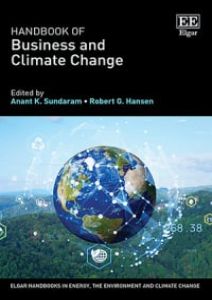

Author(s):
Summary:
The Handbook of Business and Climate Change analyzes how businesses contribute to and are affected by climate change, looking closely at their centrality in developing and deploying solutions to address this problem.
Contributions from a global collection of scholars and practitioners explore a broad range of key industries’ impacts and responses to climate change, examining corporate strategy and leadership in the climate economy, functional perspectives and corporate practice, and climate finance. Chapters use diverse case studies to analyze climate-related business issues, including
- supply chain management
- decarbonization
- consumer decision-making
- climate-related financial investments
The Handbook delves deeper into:
- how businesses perceive the issue of climate change
- how they are affected by and engage with it
- the impact they have and what this impact costs
Foreseeing, it concludes with reflections from the contributors on what the future holds for businesses and climate change.
Contents:
PART I THE BUSINESS CASE FOR CLIMATE CONCERNS
PART II KEY INDUSTRIES: IMPACT AND RESPONSE
PART III CORPORATE STRATEGY AND LEADERSHIP IN THE CLIMATE ECONOMY
PART IV FUNCTIONAL PERSPECTIVES AND CORPORATE PRACTICE
PART V CLIMATE FINANCE
PART VI THE FUTURE
Gianfranco Gianfrate, Research Director at EDHEC-Risk Climate Impact Institute contributed to the book with the chapter: Cost of capital and climate risks.
Cost of capital is a key element for corporate finance and investment decisions. Global companies and investors are increasingly treating environmental and social risks as a key aspect when making investment and financing decisions, pricing financial assets, and deciding on the allocation of their investment portfolios. Consequently, there is a growing realisation that better environmental (or sustainability) performance results in a reduced cost of capital. CFOs may thus be interested in improving the sustainability profile of the company.
| Type : | Book |
|---|---|
| Date : | 19/01/2023 |
| Editor : | Edward Elgar |

